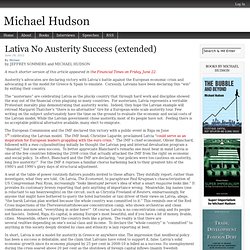

Austerity is wreaking havoc, but the left can unite to build a better Europe. More than 1,000 young people a day are joining the ranks of Europe's unemployed.

In the past four years the army of jobless people across the continent has grown by more than 10 million. In Greece, despite the government's claim that austerity has been a success, the 2014 budget imposes new public spending cuts and more job losses. The economic and humanitarian catastrophe is unprecedented in peacetime: 27% unemployment, 60% youth unemployment, a 25% shrinking of GDP, 40% reduction in family income. And, even after relentless pain, the debt-to-GDP ratio is almost 180%. Neoliberalism and public unrest: Time to make the connection - Opinion. The people are angry.

In Turkey, Brazil, and most recently again, Egypt, thousands have taken to the streets to voice their anger and frustration at the lack of social and economic justice. Political and economic elites, working in tandem, have managed to neutralise the aspirations of ordinary people, in part spurring the disenfranchisement driving the protests. Whether it is the removal of subsidies protecting the poor against inflation and price shocks in Egypt, or the enormous cost of hosting high profile sporting events in Brazil at the expense of social services, or government plans to commercialise a beloved public park in the heart of Istanbul, the headlong embrace of neoliberal economic policies by governments is likely to cause further dissatisfaction and unrest across the globe.
Despite mainstream perceptions, the sad reality is that free markets don't automatically regulate themselves nor do they naturally respect individual or community rights. The indecent inconsistency of the neo-liberals. Last weekend, the Australian government announced a major new funding initiative for farmers.

The so-called – Farm Finance Program – will handout millions to farmers who are struggling to make ends meet. Austerity as law not political discretion. I agree that we should have speed limits and other traffic regulations to prevent mayhem and carnage on our roads.

There are other laws I agree with such as protecting children from sexual predators and laws protecting citizens from police brutality and processes to allow us to monitor and prosecute corruption in public office etc. The end of a psuedo-scientific illusion - Opinion. Buried beneath the avalanche of attention to the Boston Marathon bombing, one of the most remarkable stories of the last few years reverberated through the economic community beginning on April 15.

A 28-year-old graduate student, Thomas Herndon of the University of Massachusetts, had discovered three significant flaws - including a dunderheaded Excel coding error - in arguably the most influential economics paper of the last five years, "Growth in a time of debt", by Carmen Reinhart and Kenneth Rogoff. The flaws Herndon found essentially destroyed the paper's main argument, that countries with debt-to-GDP ratios over 90 percent were at high risk of negative growth rates, thus making it urgent for most governments to slash spending, rather than worrying about mass unemployment, as countries have routinely done since the Great Depression in the 1930s. In a paper co-written with two economics professors, "Does High Public Debt Consistently Stifle Economic Growth? Pain Without Gain. The Urge to Purge. The Chutzpah Caucus. More evidence that financial markets imposed excessive austerity in the eurozone.
Fabian Fritzsche – Die Mär von den ewig steigenden Staatsschuldenquoten. In praktisch keiner Diskussion zum Thema expansive Fiskalpolitik vs.

Austeritätspolitik kommt nicht irgendwann der Hinweis darauf, dass Regierungen sowieso nicht mit Geld umgehen können und die Schulden daher immer steigen, also auch in guten wirtschaftlichen Zeiten nicht zurückgeführt werden – ein Befund, der sich empirisch überhaupt nicht bestätigt. Selbst wenn, so heißt es, die keynesianische Idee also möglicher Weise theoretisch sinnvoll sein könnte, in schlechten Zeiten die Konjunktur zu beleben, würden alle Politiker anschließend „vergessen“, danach zu konsolidieren und damit wäre eine solche Politik praktisch dann doch nicht sinnvoll.
Helfen deregulierte Arbeitsmärkte in den südlichen Eurostaaten bei der Bekämpfung der Eurokrise? Troika schlägt Deregulierung der Arbeitsmärkte vor Die Troika hat zur Bekämpfung der Eurokrise in den Südstaaten Griechenland, Italien, Portugal, und Spanien neben einer rigorosen Sparpolitik auch eine Deregulierung der jeweiligen nationalen Arbeitsmärkte vorgeschlagen.

Beispielsweise empfiehlt die Troika im Falle von Griechenland, dem prominentesten Sorgenkind unter den Euroländern, landesweit Kündigungsfristen zu halbieren, Abfindungen stark zu senken, die 6-Tages-Woche wieder einzuführen, und das Renteneintrittsalter von 65 Jahren auf 67 Jahre zu heben; zudem sollen auf betrieblicher Ebene Arbeitstage mit bis zu 13 Stunden möglich werden. Direkt und indirekt wirken diese Reformen wie eine Absenkung der Lohn(stück)kosten für den Unternehmer. Austerity – The History of a Dangerous Idea. The poverty of austerity exposed - Opinion. The aftermath of "debtgate" - the revelation of eggregious flaws in the key economic study, " Growth in a time of debt " [PDF], predicting economic doom for countries with debt/GDP ratios over 90 percent - leaves the advocates of fiscal austerity without a proverbial fig leaf, as austerity throughout the eurozone continues to predictably fail . Yet, the political momentum for austerity still seems relatively strong, despite tentative hedging here and there.
One just has to wonder - "Why? " Austerity has never worked. Last week saw a string of bad economic news reports.

The eurozone leaders seem unwilling or unable to change from their austerity policies, even as Greece and Spain fall apart and the core eurozone economies contract. Britain watches on as its economy is heading for the third consecutive quarter of contraction, with an unexpectedly sharp fall in manufacturing. Last week's jobs figures confirmed that the US recovery is stuttering.
The largest developing economies that have so far provided some support for world demand levels – especially India and Brazil but even China – are slowing down too. Four years after the financial crisis began, many rich capitalist economies have not recovered their pre-crisis output levels. Even more serious is the unemployment problem. Austerity Seen Failing in Southern Europe: Video. Europe’s Austerity Madness. What Greece Means. Lativa No Austerity Success (extended) A much shorter version of this article appeared in the Financial Times on Friday, June 22.

Austerity’s advocates are declaring victory with Latvia’s battle against the European economic crisis and advocating it as the model for Greece & Spain to emulate. Austerity1. Austerity is undermining Europe's grand vision. Citizens in Europe are rejecting austerity policies as deeply misguided. The outcome of the Italian elections should send a clear message to Europe's leaders: the austerity policies that they have pursued are being rejected by voters. The European project, as idealistic as it was, was always a top-down endeavour. But it is another matter altogether to encourage technocrats to run countries, seemingly circumventing democratic processes, and foist upon them policies that lead to widespread public misery. Demonstrations in the EU. Thousands march in Spain against austerity - Europe. Thousands of Spanish and Portuguese protesters have taken to the streets of Madrid and Lisbon to rally against new anti-austerity measures aimed at avoiding international bailouts.

Organisers estimated that 50,000 people turned out in Lisbon on Saturday, where demonstrators threw tomatoes and fireworks at the local headquarters of the International Monetary Fund as anti-riot police stood guard. In Madrid, the demonstrators assembled in groups at noon along the central streets of the capital city in a rally against spending decreases and tax increases - designed to avoid a financial bailout. "We want to say loud and clear to the government that we do not agree, that its policies cause too much damage, that we will not resign ourselves because there are alternatives," CCOO trade union head Ignacio Toxo told the rally. Adequate interest rate level These measures were part of austerity measures worth 102bn euros ($126.5bn) to be implemented by 2014 to reduce Spain's public deficit.
Massive Proteste in Portugal - Politik. Lissabon - Der Erfolgsstory Portugals als „Musterschüler“ unter den europäischen Krisenländern droht ein jähes Ende. Das Elend nimmt rasant zu. Europe is in dire need of lazy spendthrifts. Greece's economic crisis is a gift from heaven for the German government. The country is the ideal conservative dystopia of an irresponsible government financing a supposedly overblown welfare state by ever increasing debt, where workers enter retirement in their mid-50s, the dead continue receiving pension payments and public employees earn bonuses for arriving punctually at work. Never mind that, exceptions aside, public expenditure as a proportion of GDP is lower in Greece than Germany and the average Greek works longer hours and retires only half a year earlier than the average German. That did not stop those stories from being widely reported by the German media.